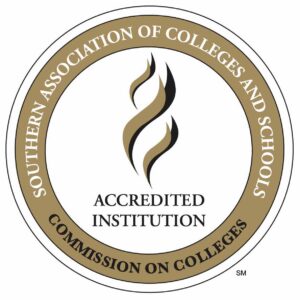
Saint Augustine’s University is accredited by the Southern Association of Colleges and Schools Commission on Colleges (SACSCOC) to award baccalaureate and master’s degrees. Questions about the accreditation of Saint Augustine’s University may be directed in writing to the:
Southern Association of Colleges and Schools (SACSCOC)
1866 Southern Lane
Decatur, Georgia 30033-4097
or by calling: 404.679.4500
or by using the information available on SACSCOC’s website: (www.sacscoc.org)
2023 SACSCOC UPDATE
Affiliations
- CIC – Council on Independent Colleges
- NCICU – North Carolina Independent Colleges and Universities
- CRC – Cooperating Raleigh Colleges
University Leadership Team
Dr. Marcus Burgess, Interim President
Dr. Janelle Jennings-Alexander, Interim Provost & Vice President for Academic Affairs
Dr. Lynda Batiste, Senior Vice President for Finance and Chief Operations Officer
Dr. Leslie Rodriquez-McClellon, Vice President of Community Relations & Government Affairs
Dr. Indrani Singh, Interim Vice President of Institutional & Sponsored Research
Mr. Stephen Latson, Interim Executive Director of Institutional Advancement
Mission and Vision
Mission Statement
The mission of Saint Augustine’s University is to sustain a learning community in which students can prepare academically, socially and spiritually for leadership in a complex, diverse and rapidly changing world.
Vision Statement
Saint Augustine’s University will be nationally recognized as a comprehensive institution with high performing students, renowned faculty, focused community engagement and a strong alumni base of change agents.
Student Achievement Data
Substantive Change Policy
POLICY
Saint Augustine’s University is accredited by the Southern Association of Colleges and Schools Commission on Colleges (SACSCOC) and complies with its Substantive Change Policy and Procedures. Saint Augustine’s University (SAU) is required to submit any substantive changes to SACSCOC for notification and/or approval. A substantive change is a significant modification or expansion of the nature and scope of an accredited institution. The purpose of SAU’s substantive change policy and procedure is to ensure that all substantive changes are reported to SACSCOC in a timely fashion as required by Substantive Change Policy and Procedures. Substantive change includes high-impact, high-risk changes and changes that can impact the quality of educational programs and services.
PROCEDURE
After consultation with the Director of Accreditation and Compliance to determine the nature of the change, the substantive change documentation must be submitted to the Chair of the Department and Dean of the School. Following their approval, the proposal for change is submitted to the Curriculum Council and Faculty Assembly before it moves to the Office of the Provost for final approval. The substantive change, if approved, is then sent to SACSCOC for review and approval. This is in accordance with the change process as outlined in the Curriculum Council Handbook.
Substantive changes, including those required by federal regulations, include:
- Substantially changing the established mission or objectives of an institution or its programs.
- Changing the legal status, form of control, or ownership of an institution.
- Changing the governance of an institution.
- Merging / consolidating two or more institutions or entities.
- Acquiring another institution or any program or location of another institution.
- Relocating an institution or an off-campus instructional site of an institution (including a branch campus).
- Offering courses or programs at a higher or lower degree level than currently authorized.
- Adding graduate programs at an institution previously offering only undergraduate programs (including degrees, diplomas, certificates, and other for-credit credential).
- Changing the way an institution measures student progress, whether in clock hours or credit-hours; semesters, trimesters, or quarters; or time-based or non–time-based methods or measures.
- Adding a program that is a significant departure from the existing programs, or method of delivery, from those offered when the institution was last evaluated.
- Initiating programs by distance education or correspondence courses.
- Adding an additional method of delivery to a currently offered program.
- Entering into a cooperative academic arrangement.
- Entering into a written arrangement under 34 C.F.R. § 668.5 under which an institution or organization not certified to participate in the title IV Higher Education Act (HEA) programs offers less than 25% (notification) or 25-50% (approval) of one or more of the accredited institution’s educational programs. An agreement offering more than 50% of
one or more of an institution’s programs is prohibited by federal regulation. - Substantially increase or decreasing the number of clock hours or credit hours awarded or competencies demonstrated, or an increase in the level of credential awarded, for successful completion of one or more programs.
- Adding competency-based education programs.
- Adding each competency-based education program by direct assessment.
- Adding programs with completion pathways that recognize and accommodate a student’s prior or existing knowledge or competency.
- Awarding dual or joint academic awards.
- Re-opening a previously closed program or off-campus instructional site.
- Adding a new off-campus instructional site/additional location including a branch campus.
- Adding a permanent location at a site at which an institution is conducting a teach-out program for students of another institution that has ceased operating before all students have completed their program of study.
- Closing an institution, a program, a method of delivery, an off-campus instructional site,
or a program at an off-campus instructional site.
Contact
Janelle Jennings-Alexander, Ph.D.
Interim Provost & Vice President for Academic Affairs
919.516.4608
